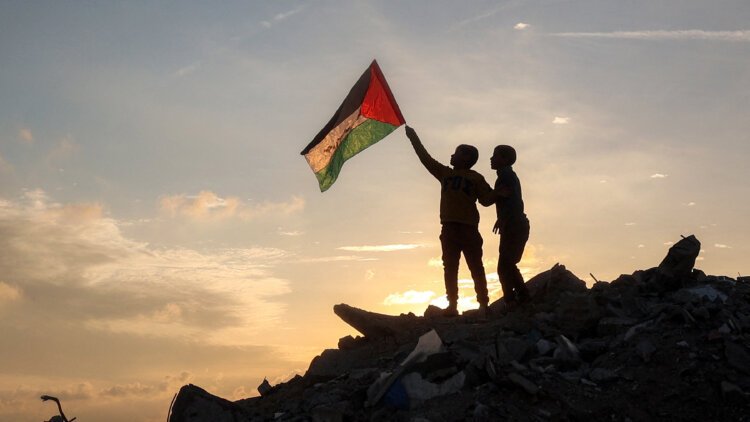History is not merely a chronicle of empires and treaties; it is the eternal contest between power and weakness. Power speaks the language of peace while holding the sword of violence; the weak cry for justice while bleeding on the ground. Palestine is perhaps the most tragic stage on which this ancient philosophy of history has been played for over seven decades.
Oslo Accord: Hope or Mirage?
In the early 1990s, the Oslo Accord was hailed as a dawn of peace. Yasser Arafat, Chairman of the Palestinian Authority, and Israeli Prime Minister Yitzhak Rabin signed the accord in the presence of U.S. President George H. W. Bush. For the first time, Israel hinted at recognizing a Palestinian state. Embassies were opened, celebrations erupted across the Arab world, and King Fahd of Saudi Arabia even gifted an aircraft to the Palestinian leadership.
Yet, the promise soon dissolved into illusion. The powerful had made pledges, but these remained empty words on paper. The weak had hoped for freedom, but what they received was disillusionment. As the Qur’an warns:
“And do not incline towards those who do wrong, lest the Fire should touch you.”
(Surah Hud, 11:113)
Palestine leaned on the promises of the oppressor, and the reward was fire and blood.
Internal Divisions: A Wound that Became a Scar
It is a truth of history that nations fall less from the enemy without and more from division within. Palestine has been no exception. The rivalry between Fatah under Arafat and Hamas hardened into open hostility. Gaza and the West Bank became separate worlds.
For Israel, this division was the ultimate victory. Instead of facing a united nation, it faced fragmented leadership. This recalls Iqbal’s admonition:
“The destiny of nations rests in the hands of individuals;
each person is a star in the fate of the community.”
When individuals fall apart, the nation’s star dims into darkness.
October 7, 2023: A Bloody Chapter
Two years ago, Hamas escalated its resistance against Israel. In response, Israel unleashed an assault of biblical proportions upon Gaza. Entire neighborhoods were flattened; over 70,000 Palestinians were killed and more than 200,000 injured. Gaza was turned into a graveyard of shattered homes and orphaned children.
The world watched in silence. Yet from this river of blood came a seed of justice: several European nations, including Britain, finally recognized the Palestinian state. Power’s cruelty had, paradoxically, compelled reluctant states to acknowledge an undeniable reality.
Trump’s 20-Point Formula: Peace or Deception?
Now, U.S. President Donald Trump has floated a 20-point peace formula with the consultation of some Muslim countries. At first glance, it appears a constructive attempt. But upon closer inspection, it reveals glaring ambiguities.
It gives no definite timeline for the withdrawal of Israeli forces. It speaks of a transitional authority for Gaza but sets no clear term for its mandate. Most troubling, reports suggest that former British Prime Minister Tony Blair may head this authority.
The irony is cruel. Blair is remembered not for peace, but for justifying the invasion of Iraq with fabricated claims of “weapons of mass destruction.” That war destroyed Iraq’s economy, institutions, and millions of lives. Later, even the CIA admitted the intelligence was false. Blair offered an apology — but can an apology wash the blood of nations?
If the man who presided over Baghdad’s destruction is now appointed custodian of Gaza, can Palestinians expect justice — or another chapter of ruin?
George Galloway’s Bitter Irony
British MP and journalist George Galloway captured the sentiment best when he remarked on social media:
“If the Devil himself is too busy, they send in Tony Blair.”
It is a remark half in jest, yet piercing in truth. Oppression often wears the face of those who speak of peace while scripting wars.
The Philosophy of Power and the Revenge of Time
Philosophy teaches us that oppression can never endure forever. The oppressor has weapons, but history possesses time. And time dismantles fortresses of tyranny.
The Qur’an reminds us:
“Indeed, the grip of your Lord is severe.”
(Surah Al-Buruj, 85:12)
No citadel of power is immune to that grip.
Allama Iqbal too foresaw the fate of tyrants:
“The oppressors collapse into their own darkness,
Time denies them the path to light.”
History’s revenge is slow, but inevitable.
The Dilemma of the Muslim World
The deeper question is not only about Trump’s formula, but about the paralysis of the Muslim world. Will it continue to play the role of a pawn in the game of global powers? Or will it awaken to forge its own destiny?
The killing fields of Gaza are not just a Palestinian tragedy; they are a mirror reflecting the weakness of an entire civilization.
Conclusion: A Warning and a Hope
Trump’s plan may temporarily halt the massacre. Yet without the guaranteed end of occupation and the recognition of full Palestinian sovereignty, it is nothing but another mirage.
The real question is whether Palestine will be granted freedom or merely administered under new custodianship. If Blair becomes Gaza’s overseer, it will be history repeating its darkest chapters.
Still, philosophy offers a measure of hope: oppression may last long, but it cannot last forever. Justice may be delayed, but ultimately, it is justice that writes the final verdict of history.
The Muslim world must recognize this moment as decisive. If it fails now, future generations may inherit only chains and ruins. But if it awakens, the blood of martyrs will not have been spilled in vain.



